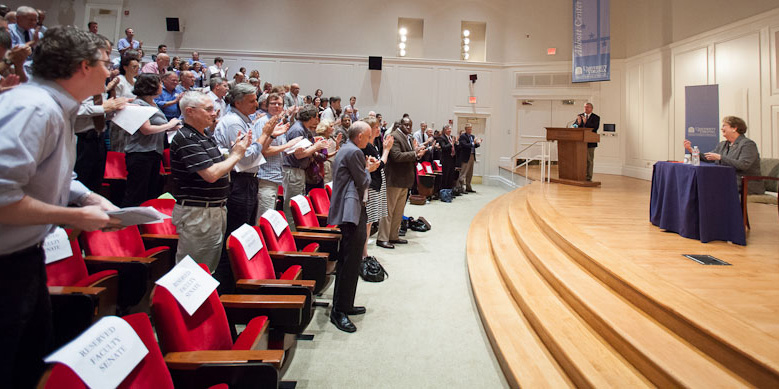In a warm show of mutual admiration and support, the University of Virginia Faculty Senate and President Teresa A. Sullivan kicked off a new academic year Tuesday by promising to work together to tackle issues of faculty pay, curriculum review and research.
Sullivan’s remarks – followed by a lengthy and lively question-and-answer session – were the first delivered to faculty as a group since her forced resignation on June 10 and reinstatement on June 26. The president didn't shy away from highlighting the prominent role faculty played in turning up the pressure that helped reverse the Board of Visitors’ decision to oust her.
“Between June 10 and June 26, the support of the faculty decisively shaped events and opened the possibility of my reinstatement,” she said at the faculty gathering, held at the Darden School of Business and live-streamed online.
Sullivan said she told new faculty members recently that she and others learned at least two new things during the crisis.
“We learned that the system of shared governance works, and we learned that a united U.Va. faculty is a force to be reckoned with,” she said.
Faculty members rewarded Sullivan with more than one standing ovation, but also didn’t shy from asking tough questions. In his introductory remarks, Faculty Senate Chair George Cohen jokingly placed a toy elephant on the podium to symbolize the ongoing presence of the events of the summer in University matters.
Cohen said the Senate shares the president’s and the board’s stated interest in moving ahead together, but he reiterated the faculty’s desire to see an “open and honest” review of what led to Sullivan’s ouster – something he said a university is obligated to conduct if it’s to live up to a mission of teaching and learning that accounts for the past as well as the future.
“Many eyes are watching us, whether we like it or not,” he said.
During brief presentations, leaders of various Faculty Senate task forces said their work includes developing proposals for the General Assembly that might change the process of board appointments and board composition. Michael Levenson, an English professor in the College of Arts & Sciences and founding director of the Institute of the Humanities and Global Cultures, said one task force has lined up a series of events through the year designed to continue the discussion about issues such as governance and to capitalize on the extraordinary unity the leadership crisis has sparked among faculty, students and staff.
“I’m glad the world is watching,” he said.
During her remarks, Sullivan outlined several priorities, including strategic planning, faculty compensation and recruitment, curriculum and research. She told faculty that she plans to take a multi-year proposal to address salaries to the Board of Visitors’ meeting next month, a proposal that recognizes state funding will likely remain stagnant and will encourage the use of endowments to supplement faculty pay.
She also expressed interest in using merit increases for faculty, but stressed that an effective and comprehensive peer review process would be a necessary component.
“If we are able to secure more substantial funds for merit increases, as I propose to do, we need to see a major change in the way that departments and schools evaluate their faculty and distribute the money,” she said.
On the topic of research, Sullivan said static federal funding is one reason why U.Va. must take a more strategic approach to its research investments so that it develops deep expertise in selected, promising areas. She added that the University must continually review and adjust its curriculum as it renews faculty to ensure that graduates enter the job market with appropriate and in-demand skills. Curriculum revisions also must account for emerging technologies and incorporate global perspectives.
“These three areas of focus – faculty, curriculum and research – are the fundamentals of a great university, and no other innovation matters without them,” she said.
A lively question-and-answer session followed her remarks, and faculty in the audience and those submitting questions online wasted no time getting right to the juicy inquiries.
Among them: How could her presidency survive if a central conflict between the Board of Visitors and Sullivan persisted? What are the details behind the recent resignation of former Executive Vice President and Chief Operating Officer Michael Strine? Why doesn't the Board show more interest in hearing from faculty? Why couldn't U.Va. accommodate a campaign stop this week on Grounds by President Obama?
As for her relationship with the board, Sullivan said she believes its members are committed to her as president and committed to seeing the full University community succeed.
“I have to go forward in that belief,” she said.
Strine’s resignation, she said, is a personnel matter, so details will not be discussed in public. In response to the question about the board’s interest in faculty, Sullivan said the setup of committees is being discussed by the board, adding that she thinks its members are interested in hearing from faculty.
Obama, who will campaign Wednesday in downtown Charlottesville, originally requested that the University allow the visit to occur in one of two locations on Grounds. Either site would have triggered a shutdown of multiple University buildings for security purposes, leading to cancellation of many classes during U.Va.’s first week of the fall semester.
“I was not going to cancel 186 classes,” Sullivan said. “That’s the reason.”
Media Contact
Article Information
August 31, 2012
/content/faculty-behind-her-sullivan-says-its-time-change

